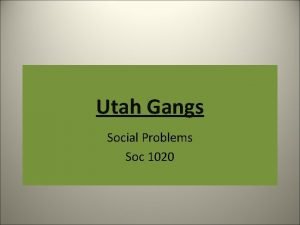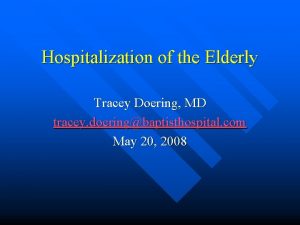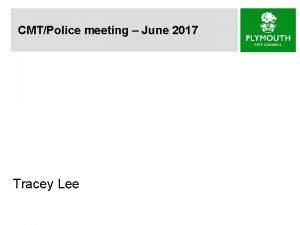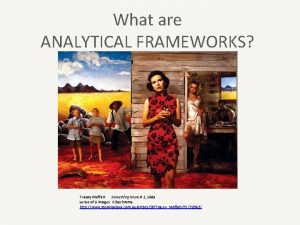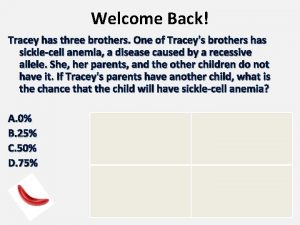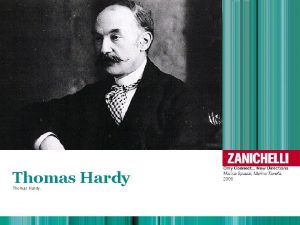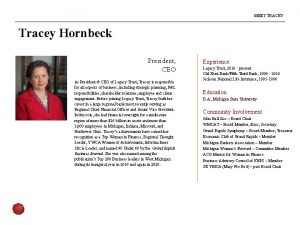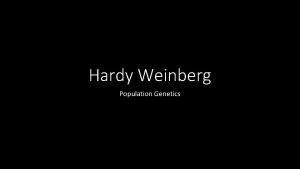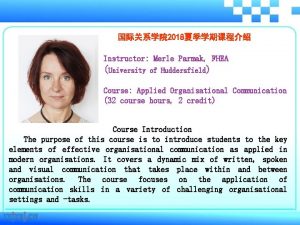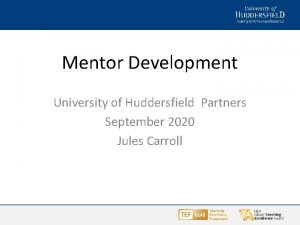Tracey Hardy University of Huddersfield The Impact of


















- Slides: 18

Tracey Hardy University of Huddersfield The Impact of Imprisonment: An Exploratory Study examining how imprisonment impacts upon family identities

Today…………. • Interest • Overview of research process to date • Researcher Positioning • Questions

Origin of Interest • Personal Familial experience • MSc Literature Review -Transitions

Context • • • 85, 930 Prison Population (^ trend) Hidden and forgotten victims of the crime Paucity of research Impact and Outcomes for parents and children ( Fishman, 1990; Boswell, 2002; Coping Project, 2010 - 2013) Shame, stigma, guilt (Condry 2007, and Codd, 2008) The material is dated Lack of analysis as to what this really means for family members in respect to how they perceive and manage their individual and familial identities within and outside their immediate and extended community.

Identity Our understanding of ourselves and others A process that establishes our sense of being in relation to ourselves, others and society A process of perception which influences how we behave, categorise and relate to ourselves and one another How families of prisoners manage to preserve or renegotiate their identity is an area which has received little attention

Shame, Stigma and Guilt • Families share a spoiled identity of the offender due to kinship ties and failure to adhere to societal norms and values • Families wish to remain hidden within society, minimise visibility of the stigma • Develop a culture of secrecy which permeates the individual , family and associated networks • Families marginalised through shame, stigma and guilt associated with imprisonment and the nature of the offence.

Questions • What is the role of family in identity? • The closer the Kin connection the greater stigma • Familiarity does not always with a reduction in contempt. Those who are close and obliged to be in contact may be less accepting • How different family members experience shame and guilt in relation to their proximity to the offender • Who are the discredited and who are the discrediting and why is this • Process of impression and information management

Aims Explore how families of prisoners serving a determinant or indeterminate prison sentence for committing a serious indictable offence construct and manage their social identity. What factors influence how different family members related to a prisoner interpretate and present their individual, familial and extra familial identity.

Objectives • Explore family cohesion and relationships and how they are disrupted and affected by imprisonment • Explore the factors that influence the individual and familial appraisal of stigma, shame and guilt • Examine how families construct and present their identity within and outside their immediate and extended social network

Unique ? • The way in which individual and familial identity is constructed and presented has not been explored within this marginalised population. Only by examining this phenomenon through a variety of familial experiences can the complexity of the impact of imprisonment be captured. This study will contribute and generate new knowledge in respect to identity theory as well as contributing and informing policy and practice.

Methodology and Recruitment • 20 semi structured Interviews with photo/artfact • Minimum 4 family networks (minimum 3 family members all connected to same prisoner) • Minimum tariff 4 yearsindictable offence • POPS- Visitor Centre • Facebook (Closed Group)

Impression Management Researcher Identity • If participants consider me as a “normal” how will they manage the information that they present to me as a researcher- how will they deal with the contingencies

Researcher Positioning Insider or Outsider Kitzinger and Wilkinson (2013) 1. 2. 3. 4. Minimize Utilise Maximise personal experience (auto ethnography) Incorporate

Waiting Room Flyer This study is about understanding of the impact of imprisonment when a member of your family has been sentenced to prison for committing a serious crime. This study wants to know about your experiences. It is important that we know about how imprisonment affects you and your family, this may help to influence the support that is available for future families. If you have a relative serving an indeterminate sentence for committing a serious crime, serving a minimum tariff of four years we would like to hear from you. As this research seeks a variety of views from different family members it is important that at least two other adult members of your family agree to take part in the research before you are interviewed. Facebook Hi I'm new to this site, so hello to everyone I have a relative in prison who is serving a prison sentence for committing a serious crime. As a family we have been effected enormously and a times have felt quiet alone and unsupported. Prison effects families and yet we at large remain a hidden and marginalised group. I feel that we serve our own sentence on the outside. This makes me think about if anyone else feels the same? 39 comments generated

Facebook-Who are you supporting? • Thanks for the warm welcome and for sharing who you are supporting. I'm supporting my cousin who has served 9 years of 24 tariff. For our family what he had done came as a massive shock and has shattered the family as it was. Some family members are supportive whilst others aren't and I always think I will be judged on his actions , so for a long time I didn't tell anyone. when we fist found out I began looking what there was out there for families, there isn't much. I work at a university and I looked at what was really known about prisoners families and what they experience. This has spurred me on to do my own research in this area so if in the future anyone would like to take part please drop me a line. Tension Researcher versus insider Reflections • Am I really supporting- wives partners actively visiting • Not physically visiting never had, sit uncomfortable. • Is it deception? • Cousin but his mother and siblings minimal • Non judgemental website and yet why don’t I visit or write? • Nature of the crime? discrediting • Visibility of the stigma and impression management

Questions?

References • Boswell, G. (2002). Imprisoned Fathers: The children’s view. Howard Journal of Criminal Justice. Vol 41(1) 14 -26. • Codd, H. (2008) Prisoners’ families and resettlement: A critical analysis. The Howard Journal. 26 (3): 255 -263. • Condry, R. (2007) Families Shamed: The Consequences of Crime for Relatives of Serious Offender: Cullompton: Willan. • Fishman, S. H. (1990) The impact of incarceration of children of offenders. In Frank, M (ed). Children of Exceptional Parents. New York: Haworth Press, 1983.

• Morris, P. (1965) Prisoners and their families. London: Allen and Unwin. • Wilkinson, S & Kitzinger, C (2013), 'Representing Our Own Experience: Issues in "Insider" Research' Psychology of Women Quarterly, vol 37, no. 2, pp. 251 -255.
 Alton cars ashbourne
Alton cars ashbourne Architectural design in huddersfield
Architectural design in huddersfield Keyword research huddersfield
Keyword research huddersfield Apa referencing huddersfield
Apa referencing huddersfield Castle hill school huddersfield
Castle hill school huddersfield Handelsbanken huddersfield
Handelsbanken huddersfield Ogden trece
Ogden trece Nursing care plan for postpartum hemorrhage slideshare
Nursing care plan for postpartum hemorrhage slideshare Tracey barnfield
Tracey barnfield Tracey hinds
Tracey hinds Tracey wong
Tracey wong Dr tracey doering
Dr tracey doering Tracey severns
Tracey severns Gomco clamp
Gomco clamp Whitton greenhouses
Whitton greenhouses Tracey lee plymouth
Tracey lee plymouth Something more (tracey moffatt)
Something more (tracey moffatt) Tracey brothers
Tracey brothers Tracey rowan eda
Tracey rowan eda






